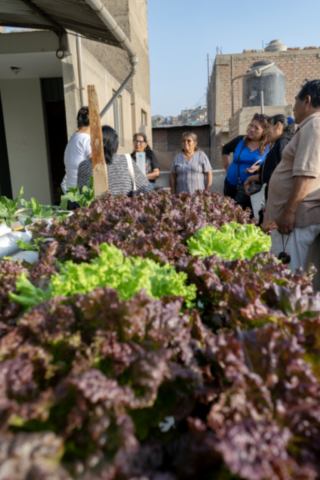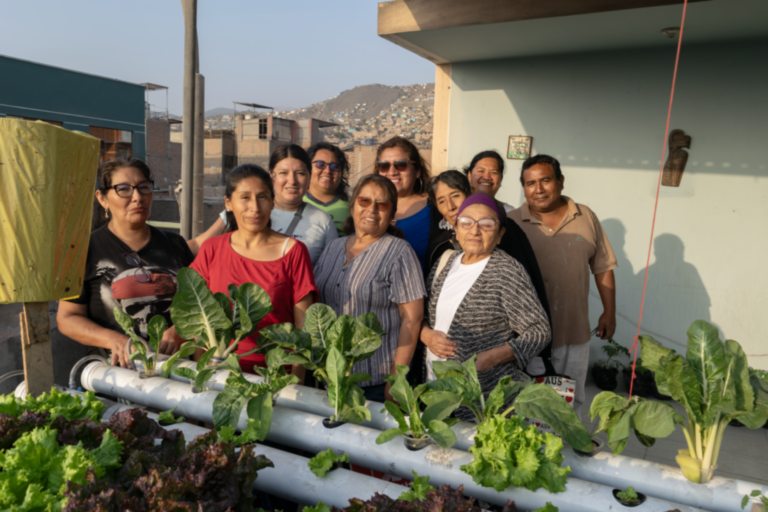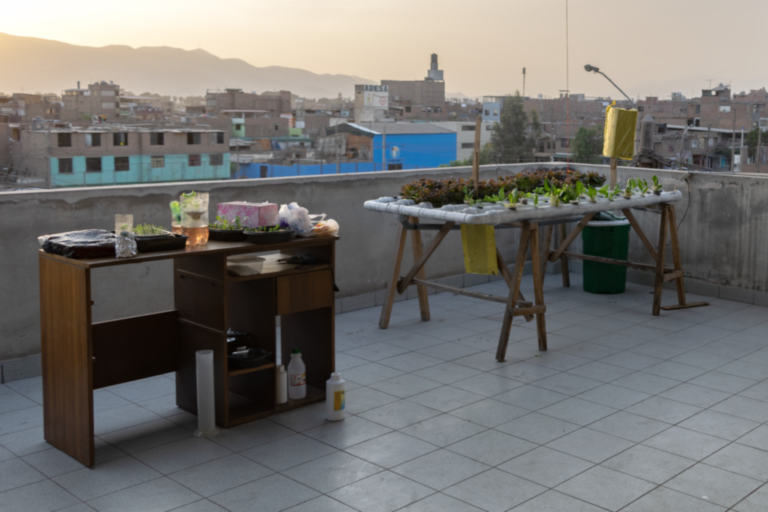Hydroponics on the Hillside Cultivating Hope in Comas!
In an arid environment with limited access to potable water, such as the hillsides of Comas, Lima Norte, the question arises: why choose hydroponic gardening? This was a central question when I presented our project at the seminar "Custodians of the Common Home in Action," organized by the Red Eclesial PanAmazónica – Centro Amazónico de Antropología y Aplicación Práctica (REPAM-CAAAP) and the Conferencia de Religiosos del Perú (CONFER) last year.
In the Año Nuevo sector of Comas district, Lima Norte, where various community kitchens, known as Ollas Comunes and Comedores Populares, have been established to combat the scarcity of nutritious food among low-income families, dependence on state aid and donations makes them extremely vulnerable to political, economic, and climatic changes, such as those triggered by the COVID-19 pandemic.
This food crisis in Peru reflects a deeper socio-environmental crisis. Agricultural communities face issues stemming from soil and water contamination due to agrochemicals, toxins, and heavy metals from extractive activities like mining and oil drilling. Additionally, many farmers are abandoning their lands due to high investment costs and low yields caused by pests, weather conditions, and other factors. Monoculture has left soils infertile and contributed to high rates of anemia in the country.
During his address at the 42nd session of the FAO Conference, Pope Francis emphasized the importance of resilient, inclusive, sustainable food systems capable of providing healthy and accessible diets for all. He stressed that "even in the face of the health, economic, and social crisis caused by Covid-19," many lack access to adequate food in quality and quantity.
From the rooftop, sowing seeds of hope

The food sovereignty project of the Local Group of Peru focuses on supporting Ollas Comunes and Comedores Populares on the hillside of Comas. Beyond food sovereignty, ecological conversion represents a path towards a sustainable and just food system. This project aims to raise awareness about integral ecology and ways to mitigate the effects of climate change on food security and sovereignty. The goal is to strengthen a more just, supportive, and sustainable food system through innovative agricultural practices based on values of equity, resilience, and care for creation.
Hydroponics, a soilless cultivation technique using mineral solutions in water to nourish plants, emerges as an efficient and innovative solution in places with limited access to fertile land and clean water, such as the highlands of Comas. It requires less water than traditional agriculture and allows precise control of nutrients, thereby increasing agricultural productivity and reducing environmental impact. Hydroponic gardens can be installed in small spaces, making them ideal for densely populated urban areas with limited natural resources.
In response, we trained in hydroponics and established a pilot project on the rooftop of our home, where we conduct training and ecological workshops for the general public. We have held workshops at the Parish, in the neighborhood, and with children. Alongside José Ángel Medina and volunteer Mariela López Vásquez, we collaborate closely with leaders of two Ollas Comunes and two Comedores Populares to advance the food sovereignty project. We started last December with integral ecology awareness sessions and practical workshops on hydroponics, with the aim of establishing a hydroponics community garden near their areas.
The hydroponic gardens project in Comas represents our commitment to justice, respect for human dignity, and integral ecology, in accordance with the guidelines of the General Assembly. By aligning with one of the seven goals of Laudato Si', responding to the cry of the poor, this project seeks to empower vulnerable communities by providing them access to healthy and sustainable food, as well as knowledge and skills for self-sufficiency, strengthening their resilience in adversity.
As a missionary, I believe in the transformative power of love and solidarity. Our work is inspired by the call of our faith to care for creation and support the most vulnerable. In the words of Pope Francis in Laudato Si', "There is no longer a separate social and environmental crisis, but one complex socio-environmental crisis." By working together on projects like this, we respond to this call with courage and compassion, promoting an integral ecology that benefits all.
This invitation extends to all of us. Let us continue to be good custodians of our common home, inspired by our faith and committed to a better world for future generations.
* Argentina Saavedra is a lay missionary from Baganga, in the Philippines. She was a missionary in Honduras and then was appointed to Peru, where she has been working since 2017.

Hydroponics
Hydroponics, a soil-less farming technique that uses mineral solutions in water to feed plants, has proved effective in places where access to fertile soil and drinking water is limited, such as the Comas highlands. It requires less water than traditional agriculture and enables precise control of nutrients, increasing agricultural productivity and reducing environmental impact. Hydroponic gardens can be set up in small spaces, ideal for densely populated urban areas where natural resources are scarce.
Biblical reflection
The local SMÉ group's missionary commitment fits well with the parable of the mustard seed in Matthew's gospel (13:31-32). A tiny seed grows into a tree that birds can use to make their nests. Addressing the issue of food sovereignty is one of today's responses to Jesus' call to the disciples, faced with a hungry crowd in a desert area far from the abundance of the city: “Give them something to eat yourselves” (Mark 6:37).



